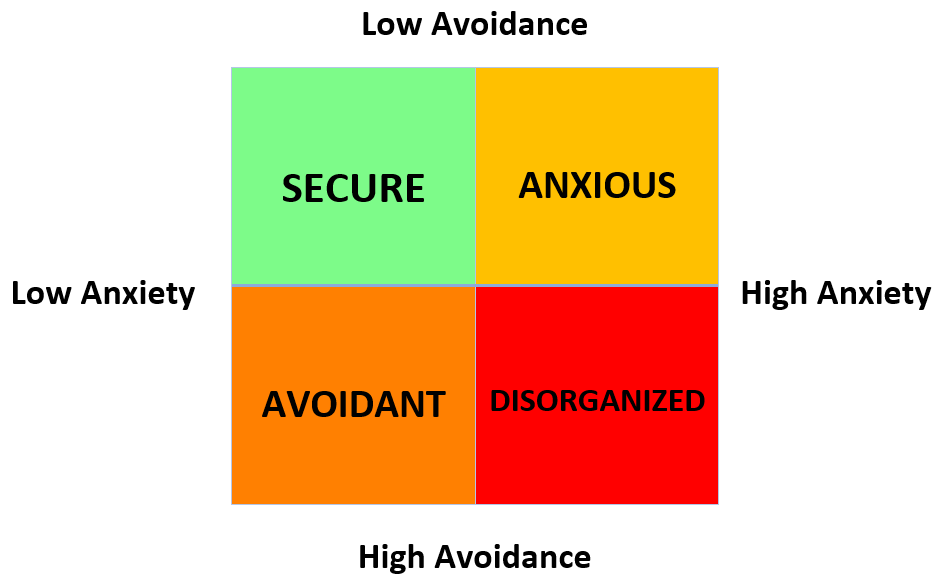An attachment style quiz is a tool that can help you better understand your relationship with others. It’s based on the theory of attachment styles and how it impacts relationships, both romantic and platonic. Attachment styles are made up of four different categories: anxious, avoidant, secure, and fearful. The quiz shows you which category best suits your personality type so that you can work to improve your relationships in the future!
Contents
Understanding Attachment Style
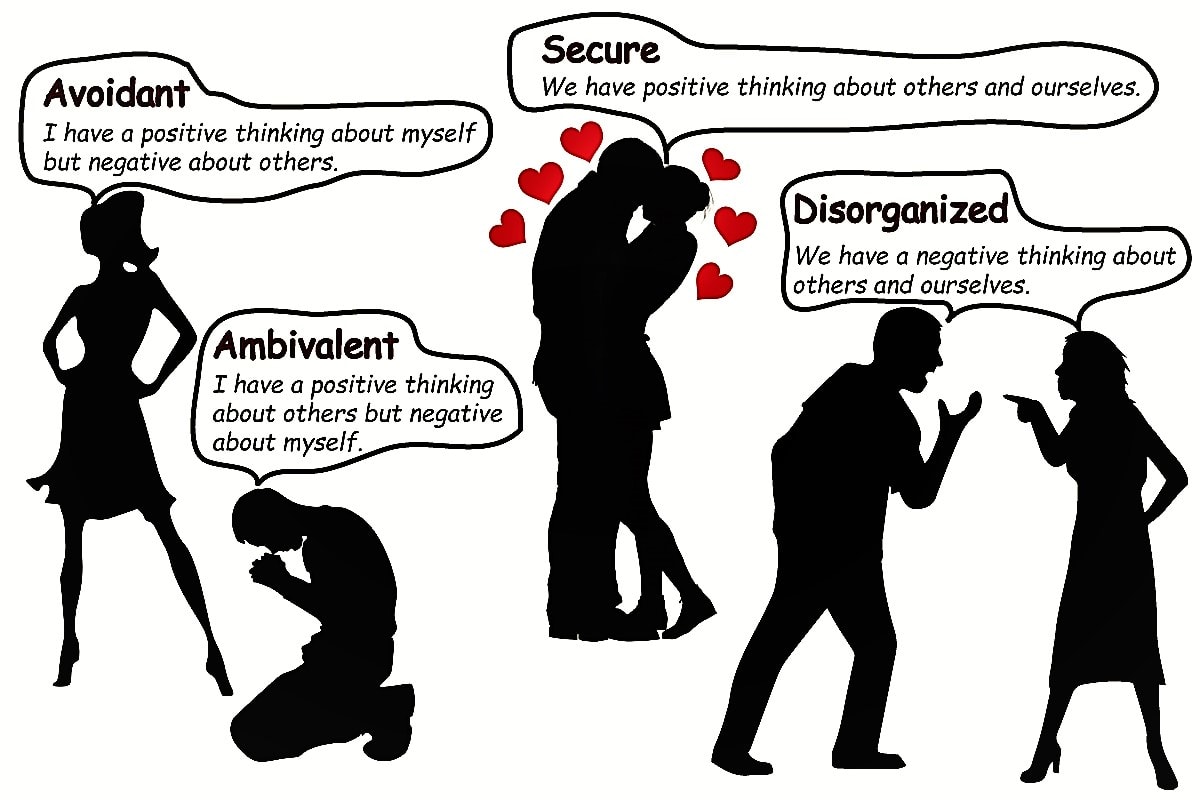
Attachment style is a psychological term that describes the way we relate to other people. It’s based on our early experiences with our caregivers, usually our parents. Our attachment style forms during childhood and continues to affect us as adults.
Types of Attachment Style
There are four different types of attachment styles: anxious, avoidant, secure, and fearful.
Avoidant Attachment Style: If you have an avoidant attachment style, you’re very independent and don’t rely on others for support very often. You see relationships as a source of stress and prefer to be alone.
Anxious Attachment Style: If you have an anxious attachment style, you’re constantly concerned about your relationships with others. You tend to worry that people are going to leave or stop loving you at any moment and this can cause a lot of emotional distress.
Secure Attachment Style: If you have a secure attachment style, your emotional needs are met in the relationship with other people. You feel secure and stable in your relationships, although you may have some ups and downs from time to time.
Fearful Attachment Style: People who have a fearful attachment style often feel very insecure in their relationships. They often have a lot of doubts and concerns about their relationships and may feel like they’re constantly on the defensive.
Attachment Style In Children
When it comes to attachment style and children, there are a few different factors at play. The first is how parents relate to their child as he or she grows up.
Secure Attachment Style
If your parent was always emotionally available for you when you were a child, you’re likely to grow up with a secure attachment style. You probably felt loved and accepted by your parent and were able to form healthy relationships as an adult that are also grounded in trust.
Anxious Attachment Style
If your parent was emotionally unavailable for most of the time when you were growing up (or worse, if he or she abused or neglected you), you’re likely to have an anxious attachment style.
You probably felt abandoned by your parent or like you needed to take care of him or her for both of you to survive, which can lead to problems forming healthy relationships later on when it comes time for romance and commitment.
Dismissive Attachment Style
Abusive parents may also be overly-controlling, which could lead to a dismissive attachment style. As you can imagine, it’s not exactly easy for children who grow up with an anxious or fearful attachment style to form healthy relationships as they get older that aren’t fraught with fear and abandonment issues.
The Good News
However, the good news is there are ways adults (and especially parents) can work on their attachment styles to benefit their children. It’s important for parents who have an anxious or fearful attachment style to seek counseling and learn how they can better healthily relate to their children.
So that he or she doesn’t end up repeating the cycle of abuse as time goes on. Parents with dismissive attachment styles should also get help because this is one of the attachment styles that are most likely to cause children emotional damage.
Decoding Attachment Style Quiz
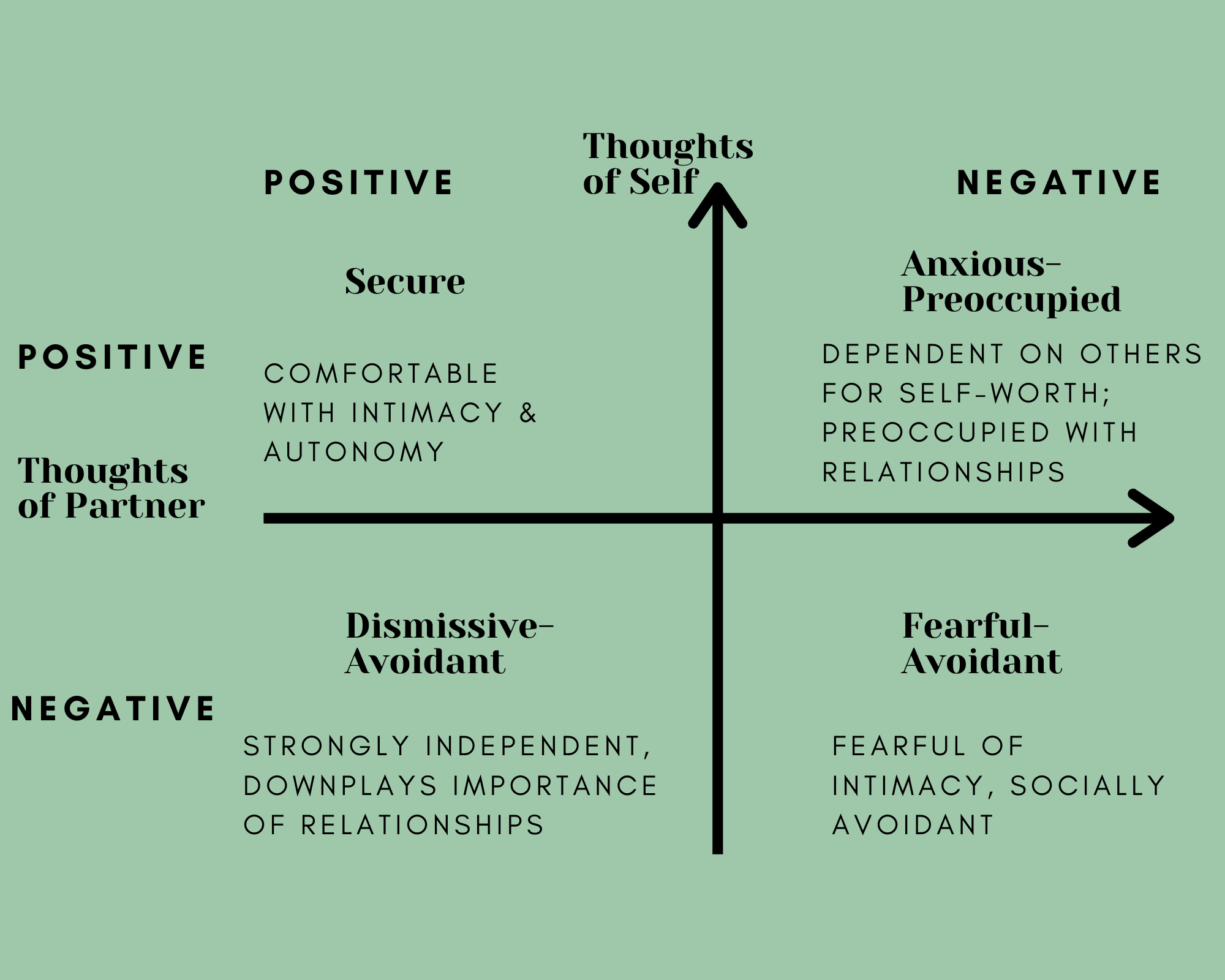
Attachment style quiz in the form of questionnaires has been around for quite some time now. This quiz is designed to help you understand your relationship with others. It’s based on the theory of attachment styles and how it impacts relationships, both romantic and platonic. They’re also used to help parents better understand how their children interact with other people at home or school. As well as to determine what type of attachment styles they exhibit during different situations.
Information Do I Get From Attachment Style Quiz
As you take the attachment style quiz, note your answers to each question on a piece of paper. The questions will help determine which category best suits your personality type based on how you answer them. Each category has its own set of characteristics so be sure to read through them all before making your decision.
The Reason I Take Attachment Style Quiz
The reason you should take this quiz is to help you better understand yourself and how you interact with others. Once you know your attachment style, you can work on improving your relationships in the future.
By taking this quiz, you’ll gain a better understanding of how your attachment style affects your relationships. You’ll also learn about the different types of attachment styles and what each one entails. This information can help improve your relationships with others in the future.
NOTE: Some people may be very eager to take an attachment style quiz when they first hear about it. Others, however, might not have any interest in taking one at all and that’s okay too!
The Time I Take Attachment Style Quiz
The best time to take this quiz is when you’re in a calm, relaxed state of mind. If you have too much going on in your life at the moment, it may be hard for you to concentrate and answer honestly.
Questions To Ask Yourself Before Attachment Style Quiz
Before you take an attachment style quiz, there are a few questions you should ask yourself. This will help you better understand how the quiz works and what to expect from it.
- Do I have enough time to complete the quiz?
- Can I answer the questions honestly?
- Am I in a calm, relaxed state of mind?
- Do I know what attachment style is?
Taking Attachment Style Quiz
There are a few things to consider before you decide if taking an attachment-style quiz is right for you.
- First, ask yourself if you’re able to answer the questions honestly. If you can’t be truthful when answering the questions, then the quiz might not be very helpful for you.
- Secondly, think about your current state of mind and whether or not you’re in a calm, relaxed state. If you’re under stress or feeling anxious at the moment, it might be best to wait and take the quiz when your mind is clear. Otherwise, your answers may skew based on how you feel emotionally rather than on what’s true for yourself.
- Lastly, if you know exactly what attachment style is, you might not need to take the quiz. However, it’s always a good idea to learn more about yourself and how you interact with others so you can work on improving your relationships in the future.
If after considering all of these factors, you think an attachment style quiz would be beneficial for you, go ahead and take one! If you’re not sure, you can always talk to a friend or family member about it and see what they think.
Procedure For Attachment Style Quiz
Here is a quick procedure you can use to ensure the best possible outcome when taking an attachment-style quiz:
Take some time out of your day and find a quiet place where you won’t be interrupted. Make sure everything else around you is calm and relaxing so that you’re in the right frame of mind for completing this quiz. Take this quiz when you’re feeling good about yourself and your relationships.
If you can, answer the questions on a scale of one to five, with one being “not at all like me” and five being “very much like me.” The quiz usually consists of a series of questions that ask about your relationships with others. It will help to determine which category best suits your personality type.
After you’ve completed the quiz, be sure to read through each description so you have a better understanding of how they apply to your life. If after considering all of these factors, you think an attachment style quiz would be beneficial for you, go ahead and take one!
NOTE: If you’re not sure, you can always talk to a friend or family member about it and see what they think.
Explaining Results And Interpretations
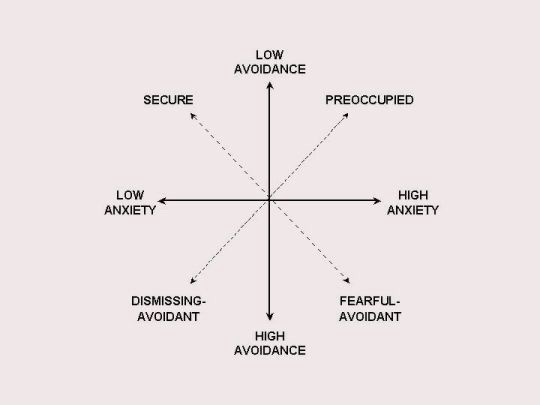
Once you’ve completed the attachment style quiz, it’s time to interpret your results. This is where having an understanding of what attachment style comes in handy.
If you’re not sure what your attachment style is, or if you have a general idea but want to learn more about the different types, read through the descriptions of each type before you decide which one fits you best.
Attachment Style Quiz Results Explained
Secure Attachment
Secure Attachment is also known as “healthy attachment,” people with a secure attachment style feel confident in their relationships and can trust their partner. They’re comfortable giving their partner some freedom without worrying that they’ll leave them, and they’re willing to work through problems when they arise. People with a secure attachment style generally have positive relationships with others.
Anxious Attachment
Anxious Attachment Also known as “anxiety-preoccupied,” people with an anxious attachment style can be prone to worrying about their relationship. They tend to have the strongest need for reassurance that the person they’re dating is going to stay around, and are sometimes prone to clinginess or jealousy. People with anxiety-preoccupied attachment styles generally have positive relationships-but can sometimes be overly clingy or jealous.
Avoidant Attachment
Avoidant Attachment Also known as “avoidance,” people with an avoidant attachment style tend to put up walls when it comes to their romantic relationships. They feel the need for independence and space, which often manifests itself as them pulling away when their partner tries to show affection. People with avoidant attachment styles tend to have positive relationships but can sometimes be overly resistant to showing intimacy or closeness.
Disorganized Attachment
Disorganized Attachment Also known as “disoriented,” people with a disorganized attachment style tend to feel uncomfortable in romantic relationships. They may feel like they’re constantly on the edge, not knowing what’s going to happen next. This can often lead to chaotic or unstable relationships. People with disoriented attachment styles generally have negative relationships with others.
NOTE: Once you’ve determined your attachment style, start thinking about how you can apply what you’ve learned to your everyday life. If you’re not sure where to start, reach out for help from a therapist or counselor who can guide you in the right direction.
Giving Attachment Style Quiz Sample Questions
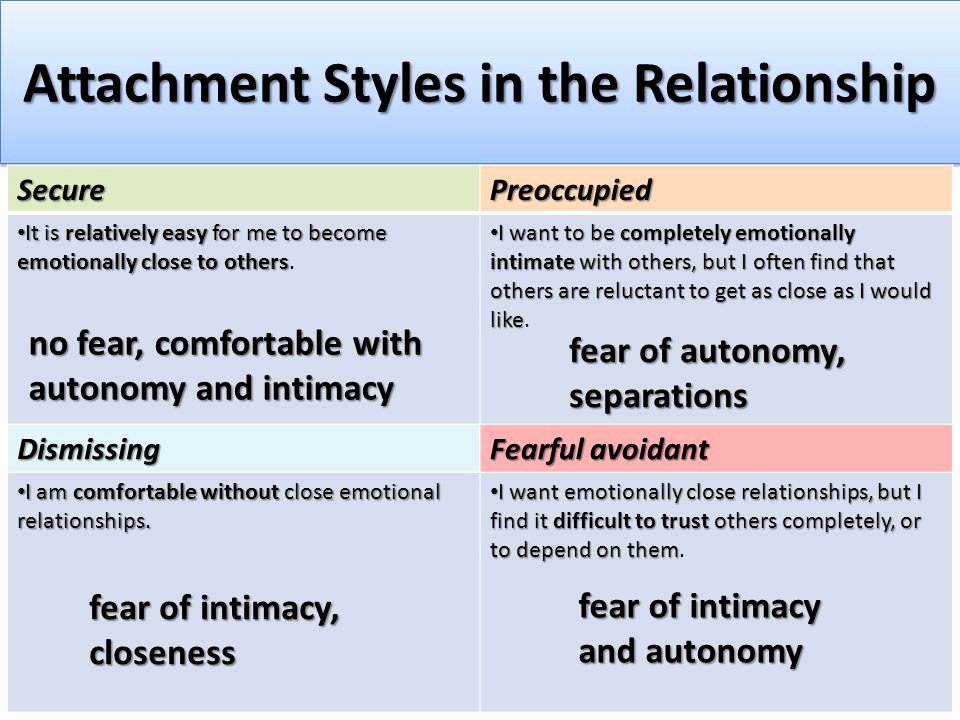
Here are a few sample questions from an attachment-style quiz that can help you get started.
Sample Questions To Determine Secure Attachment Style
- When it comes to romantic relationships, how do I feel about being in one?
- Do I want the relationship to be long-term and serious or short-lived with little commitment?
- How much time and energy am I willing to invest into this person?
- How do I feel about being with this person when the going gets tough?
- Do I run away or try to work things out once problems arise in a relationship?
NOTE: The answers you give will provide insight into how securely attached you are. A secure attachment style is one where you’re comfortable enough to allow your partner some freedom without worrying that they’re going to leave you.
Sample Questions To Determine Avoidant Attachment Style
Think about how you feel in romantic relationships.
- Do I want to be single and not take on a serious relationship?
- Am I comfortable being emotionally intimate with someone else?
- How close do people need to get before I start feeling uncomfortable or threatened by them?
- Do my feelings change depending on who it is that’s getting too close?
- Do I have a lot of close friends and family members?
- When it comes to relationships, do I feel like I need my partner to complete me or that I’m not interested in being with anyone else?
NOTE: The answers you give will help identify if you have an avoidant attachment style. Avoidant attachment styles are characterized by a desire for independence and space in relationships. People with this attachment style often find it difficult to be emotionally intimate with their partners.
Sample Questions To Determine Anxious Attachment Style
Think about how you feel about being in a romantic relationship. Do I:
- Need constant reassurance that my partner is still interested in me?
- Feel like I’m constantly on the lookout for signs that my partner is going to leave me?
- Get jealous easily or find myself constantly wondering if my partner is cheating on me?
- When it comes to relationships, do I feel like I need someone to take care of me and make all the decisions for me?
NOTE: The answers you give will help identify if you have an anxious attachment style. Anxious-attachment styles are characterized by high levels of dependency and insecurity in relationships, leading to clingy behavior or excessive worry about the relationship’s status. People with this type of attachment style often make healthy romantic partners but could stand some work on their self-esteem and trust issues.
Sample Questions For Fearful Attachment Style
Think about how you feel about being in a romantic relationship. Do I:
- Feel like I’m constantly in danger when it comes to relationships?
- Find myself getting angry or upset when my partner doesn’t do what I want them to do?
- Do I often fear that my partner is going to leave me and am always on the lookout for signs of this happening?
- When it comes to relationships, do I feel like I’m always the one who’s doing all the work?
NOTE: The answers you give will help identify if you have a fearful attachment style. Fearful-attachment styles are characterized by high levels of anxiety and insecurity in relationships. People with this type of attachment style often find it difficult to trust their partners and can be easily angered or upset. They often take on the role of caretaker in their relationships, doing most of the work themselves.
Handling Results
Now that you’ve taken the attachment style quiz, it’s time to see how well it captured your personality. Don’t worry if you scored differently on different sections of the test – this is normal! People have varying personalities depending on their experiences and environment which means no two people will respond exactly alike.
However, once you’ve got a general idea of what your attachment style is, it’s time to start thinking about how you can apply this information to your everyday life. If you’re not sure where to begin, reach out for help from a therapist or counselor who can guide you in the right direction.
NOTE: If you feel like the quiz didn’t quite capture your personality accurately, don’t worry! Quizzes are never 100% accurate and it’s always a good idea to get a second opinion from someone you trust.
If You Disagree With Quiz Results
If you don’t agree with your quiz results, don’t worry! This is perfectly normal, and everyone responds differently to different situations. The important thing is that you start paying attention to how you behave in relationships so you can work on improving your attachment style. If you’re still unsure about where to start, reach out for help from a therapist or counselor who can guide you in the right direction.
A Few Things To Know About Attachment Quizzes
If you’re considering taking an attachment style quiz, it’s important to keep these tips in mind:
Aren’t An Accurate Diagnosis
Attachment styles are primarily based on your behavior and how you interact with others. These quizzes aren’t meant as a way of diagnosing whether or not someone has certain mental health issues they’d simply be meant as a way of helping people determine their attachment style and what they can do to improve it.
Results Aren’t Always Accurate
Although these quizzes are designed with the best intentions, they aren’t always 100% accurate in determining your attachment style or explaining how you’ll react in romantic situations. The most important thing to remember is that you always have a choice as to how you act-and if your quiz results don’t match up with what’s going on in real life, it might be time for some self-reflection.
Results Don’t Necessarily Affect Your Long Term Relationship
Attachment style tests aren’t meant to determine whether or not you have a healthy relationship. Instead, they’re meant to help you understand where your attachment style comes from so that you can work on improving it and making sure all of your relationships remain positive (even if they aren’t romantic).
Results Are Just For Fun
While some quizzes claim to be 100% accurate in determining your attachment style, it’s important to remember that these quizzes are meant for fun. They can provide some interesting information about yourself and how you interact with others but they shouldn’t be taken too seriously.
Improving Your Attachment Style
While you may have a “healthy” attachment style, there are still things you can do to make sure your relationships remain positive. If you tend to be anxious or avoidant in romantic situations, you must work on showing the other people around you the love and affection they need – even if it isn’t easy.
If you tend to be disorganized, you must work on creating healthy boundaries with the people around you by having a better idea of what they expect from your relationship and how much time is too much time when it comes to dating someone new.
Attachment Style FAQs
Q: What if I don’t have a “healthy” attachment style?
A: This is normal, and everyone has room for improvement when it comes to their relationships. The important thing is that you start working on improving your attachment style by paying attention to how you behave in relationships and working on improving it.
Q: How long will it take for my attachment style to change?
A: This depends on a variety of factors, including how severe your attachment style is and how much work you’re willing to put into changing it. However, most people see changes in their relationship behavior within the first few months of therapy or counseling.
Q: At what age should I take an attachment style quiz?
A: Attachment styles are primarily a result of early childhood experiences and the kind of parenting children receive. Therefore, it’s best to wait until you’re at least a teenager before taking an attachment style test so that your answers will be as accurate as possible.
Q: How often do I need to take an Attachment Style quiz?
A: This depends on your personal goals. Some people like taking these quizzes every few months so that they can track their progress, while others only want to take them once a year. The important thing is that you choose the frequency of how often you’d like to take these tests and stick to them. This will help you keep track of your progress and make sure that you’re always improving every step of the way.
Conclusion
In sum, the attachment style test helps understand the relationship behavior of an individual. Attachment styles are primarily based on early childhood experiences and the way parents brought up their kids.
To understand your behavior or correct it, you can take one from various sources like free quizzes online, paid tests, etc which will tell about how likely you are to become attached and how you behave in relationships.
Nevertheless, it is important not to take the attachment style quiz results too seriously. Their main purpose is for giving you a rough idea and some fun and entertainment. Also, there are ways to improve your relationship behavior even if you have an anxious or avoidant attachment style.
So don’t worry if the quiz results were not as great as you expected because there is always room for improvement. And lastly, remember to take the quiz regularly to track your progress!
A Word From Therapy Mantra
Your mental health — Your psychological, emotional, and social well-being — has an impact on every aspect of your life. Positive mental health essentially allows you to effectively deal with life’s everyday challenges.
At TherapyMantra, we have a team of therapists who provide affordable online therapy to assist you with issues such as depression, anxiety, stress, workplace Issues, addiction, relationship, OCD, LGBTQ, and PTSD. You can book a free therapy or download our free Android or iOS app.
